English - PRAVASI BHARATIYA - Overseas Indian
English - PRAVASI BHARATIYA - Overseas Indian
English - PRAVASI BHARATIYA - Overseas Indian
You also want an ePaper? Increase the reach of your titles
YUMPU automatically turns print PDFs into web optimized ePapers that Google loves.
NEWSRIYADH CALLINGPrime Minister Dr. Manmohan Singh addressing the Majlis Al Shura, in Riyadh, Saudi Arabia, on March 1, 2010SAUDI SOJOURNThe Prime Minister’s Saudi Arabia visit was the first by an <strong>Indian</strong> PMafter Indira Gandhi in 1982, and helped firm up bilateral strategic tiesIn a rare honouraccorded to aforeign dignitary,Dr. ManmohanSingh was invited to address the Majlis-ash-Shura, the Saudi parliament, where he saidIndia would grow at 9 to 10 percent forthe next 25 years<strong>Indian</strong> Prime Minister Dr. ManmohanSingh on March 1 concludeda historic three-day visitto Saudi Arabia during which10 bilateral pacts were signed andthe Riyadh Declaration was sealedto firm up ties between India and theinfluential Arabic Gulf nation.In a rare honour accorded to a foreigndignitary, Dr. Singh was invitedon March 1 to address the Majlisash-Shura,the Saudi parliament,where he not only sought investmentsfrom the Islamic kingdom, butalso pressed the need for Pakistan to“act decisively against terrorism”.Dr. Singh said the challenge of terrorismwas immense in Afghanistan,where a Taliban suicide attack onFebruary 26 in Kabul left 17 peopledead, including nine <strong>Indian</strong>s. ThePrime Minister also said that Indiawould grow at the rate of 9 to 10 percentfor the next 25 years.Dr. Singh visited the King SaudUniversity, where an honorary doctoratewas conferred on him. He leftthe Saudi capital for home afterattending a function at the <strong>Indian</strong>embassy where he met representativesof the 1.8 million <strong>Indian</strong> expatriatecommunity.The Saudi visit was the first by an<strong>Indian</strong> prime minister after IndiraGandhi’s in 1982. Dr. Singh andSaudi King Abdullah Bin Abdul Azizsigned the ‘Riyadh Declaration — ANew Era of Strategic Partnership’ onFebruary 28.A pathbreaking extradition treatywas signed to enhance the existingsecurity cooperation between thetwo countries. Many other agreementswere also signed.Besides the king, Dr. Singh alsomet Saudi Foreign Minister PrinceSaud Al-Faisal, Petroleum and MineralResources Minister Ali Al-Naimi and, Commerce and IndustryMinister Zainal Alireza.Dr. Singh arrived to an unprecedentedwelcome in the Saudi capitalwhen, setting aside protocol, theSaudi crown prince and the entirecabinet turned up at the airport toreceive the <strong>Indian</strong> leader. KingAbdullah officially welcomed him ata grand ceremony where a guard ofhonour was presented and a statebanquet thrown in his honour.India and Saudi Arabia signedthe Riyadh Declaration late onFebruary 28 night to put theirseal of approval on rapidlygrowing ties that are movingtowards a strategic partnership coveringsecurity, economic, defence,technology and political areas, andincluding joint combat of terrorism.The ‘Riyadh Declaration — A NewEra of Strategic Partnership’ wassigned by Prime Minister Dr. ManmohanSingh and Saudi Arabia’sKing Abdullah bin Abdul Aziz AlSaud at a ceremony at the Al RawadPalace in Riyadh.“The two leaders reviewed the statusof implementation of the historicDelhi Declaration signed in2006, and expressed their satisfactionat the steady expansion ofSaudi-India relations since the signingof the Delhi Declaration,” thenew declaration read. “They reemphasisedthe importance of fullimplementation of the Delhi Declarationthrough exchange of visits atministerial, official, business,academia, media and other levels.”The Delhi Declaration, signedduring the historic visit of KingAbdullah to India in 2006 as thechief guest on India’s Republic Day,had charted out a new path of cooperationbetween India and SaudiArabia across a range of fieldsincluding security, bilateral tradeand investment, culture, and scienceand technology. According toApathbreaking extradition treatywas among five pacts signedbetween India and Saudi Arabiain the presence of <strong>Indian</strong> PrimeMinister Dr. Manmohan Singh andSaudi Arabia’s King Abdullah BinAbdul Aziz in Riyadh on February 28.“The extradition treaty will followthe standard format such treaties followacross the world,” Latha Reddy,secretary (east) in the External AffairsMinistry, said. “It will lay down theprocedures to be followed by bothcountries. How you present an extraditionrequest, how the proceduresare to be followed and the groundsPrime Minister Dr. Manmohan Singh and the King of Saudi Arabia Abdullahbin Abdul Aziz Al Saud signing documents related to the Riyadh declaration,in Riyadh, Saudi Arabia, on February 28, 2010Riyadh Charterthe new declaration, keeping inview the development of relationsbetween the two countries, and thepotential for their further growth,the two leaders decided to raisetheir cooperation to a strategic partnershipcovering security, economic,defence and political areas.“The two leaders reiterated theirmutual desire to develop as knowledge-basedeconomies based onadvances in the areas of informationtechnology, space science andother frontier technologies,” it stated.The two leaders renewed theircondemnation of terrorism, statingthat it was global and threatened allsocieties irrespective of race, colouror belief.Minister for Health and FamilyWelfare Ghulam Nabi Azadexchanging documents of pacts ontransfer of sentenced persons andthe extradition treaty in Riyadhfor making an extradition request.”The second pact was on transfer ofsentenced prisoners to their own“The two sides agreed to enhancecooperation in exchange of informationrelating to terrorist activities,money laundering, narcotics,arms and human trafficking anddevelop joint strategies to combatthese threats,” the declaration stated.Dr. Singh and King Abdullahalso called for preservation ofAfghanistan’s sovereignty and independence.“They supported the efforts of thepeople of Afghanistan to achievestability and security, protectedfrom exploitation by terroristorganisations, while upholding thevalues and principles of the constitutionof Afghanistan,” it stated.— Aroonim Bhuyan/RiyadhLandmark extradition treatycountry. “We hope this treaty willfacilitate the transfer of <strong>Indian</strong> prisonersback to India where they couldserve the remaining (part of the) sentence(given by a Saudi court)”.The third pact was on cultural cooperation.The fourth was on scientificand technological cooperationbetween India's Department of Scienceand Technology and Saudi Arabia’sKing Abdulaziz City for Scienceand Technology (KACST). The fifthpact was on peaceful uses of outerspace between the <strong>Indian</strong> SpaceResearch Organisation and KACST.— Aroonim Bhuyan/Riyadh6 Pravasi Bharatiya March 2010 Pravasi Bharatiya March 2010 7


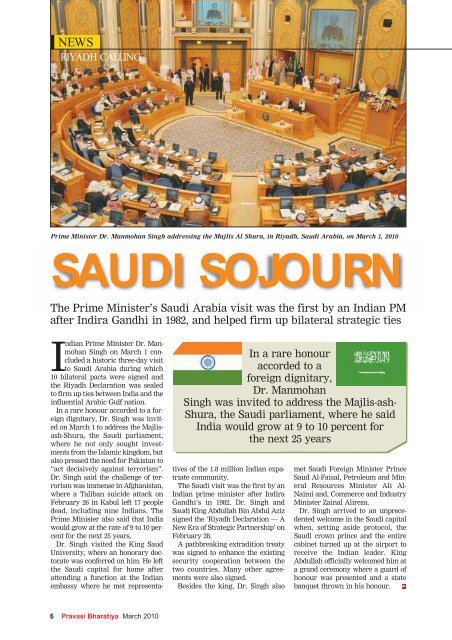
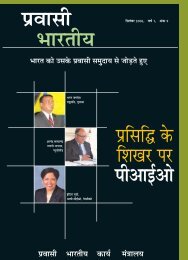

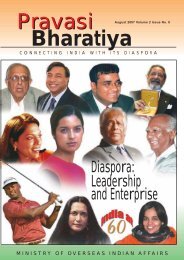

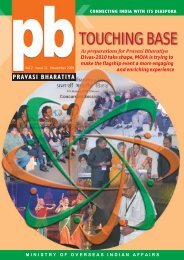
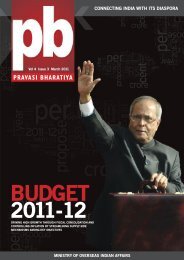
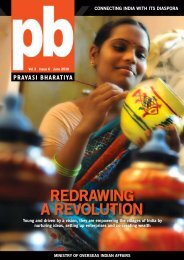
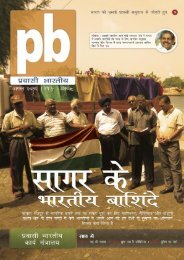

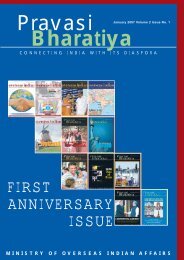
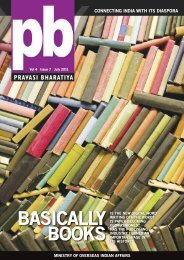
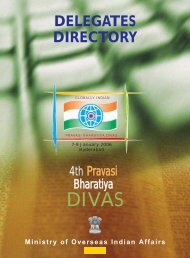
![flaxkiqj feuh izoklh Hkkjrh; fnol] vDVwcj 9&11 - Overseas Indian](https://img.yumpu.com/43977040/1/184x260/flaxkiqj-feuh-izoklh-hkkjrh-fnol-vdvwcj-911-overseas-indian.jpg?quality=85)
